#Elections Commission
Text
I don't understand why trying to overthrow the government isn't disqualifying for all public offices.
5 notes
·
View notes
Text
What is the reason for the delay in releasing voting percentage? Why the difference between provisional and final voting percentage? Election Commission surrounded by questions
New Delhi. Nothing has been officially said yet by the Election Commission (ECI) on the late release of final voting percentage figures. On the other hand, questions have been raised by the opposition on the issue of late release of voting percentage figures of the first and second phase by the Commission, while on the other hand, questions are being raised on the ability of the Election…
View On WordPress
#Commission#delay#difference#EC Final Voting percentage#Election#Elections Commission#final#final voting percentage#lok sabha elections 2024#Lok Sabha Elections voting percentage#Lok Sabha Final voting percentage#Lok Sabha First Phase voting percentage#Lok Sabha Polls 2024#Lok Sabha Polls voting percentage#Lok Sabha Second Phase voting percentage#Lok Sabha voting percentage#Lok Sabha Voting percentage Dealy#percentage#provisional#provisional voting percentage#questions#reason#releasing#surrounded#voting
0 notes
Text
Don't Lose Your Vote! UK Edition
Update: Tuesday 18th June 2024 is the deadline to register to vote for the general election.
A snap general election could be called any day. This will be the first general election that requires photo ID if you vote at the polls (postal votes 📫 are unaffected by the Election Act 2022).
If you don't have an approved form of identification (list here), you can apply for a FREE voter ID photo card. Find out more below or use these 5 minutes to register and get your ID sorted instead ❎ because, and this is important to know, the government really doesn't want young people to vote.
The Explanation
Rishi Sunak, UK Prime Minister and Leader of the Conservative Party, may call a snap election in 2023. (A snap election is a vote brought in earlier ⏱ than the one that’s scheduled 🕐) The UK’s next general election (for MPs and the PM) is meant to happen between December 2024 and January 2025.
A snap election happens in as little as 25 days 😨 between the announcement (aka the PM asking the House of Commons’ to approve the dissolution of Parliament) and the vote 🏃♀️
You must be registered to vote - currently over 8 million people are not. Unlike other a democratic countries, the UK doesn’t automatically register all eligible voters. You have to do this yourself. Here’s a quick reminder of how to register:
youtube
Over the past 15 years, it has gotten harder for British citizens to vote:
Families can no longer register to vote as a household 🏡 so young voters must register themselves (Cameron Govt)
Colleges and universities are barred from registering students 👨🎓 (Cameron Govt)
The Elections Act requires photo ID 🤳 for anyone voting in person (Johnson Govt)
Local elections (for city and town governments) in 2023 were the first votes that required VOTER ID. According to the Electoral Commission, over 14,000 people were turned away from the polls because they had not heard about the change.
The House of Lords tried to amend the Elections Act before it passed, to include more common types of ID, such as bank statements, bills, student ID, library cards and much more. This amendment was struck down in the House of Commons. A lot of the IDs included in the approved list are more likely to be owned by older voters than younger ones. For example, a 60+ Oyster Card is acceptable ID but an 18+ Oyster Card is not.
Here’s the important thing to know: voters who don’t have a driving licence or passport or other approved forms of ID, can apply for a free voter ID photo card. Watch the video below to find out how!
youtube
And finally, please, for the love of our democracy, vote.
"Democracy is not something you believe in or a place to hang your hat, but it's something you do. You participate. If you stop doing it, democracy crumbles." Abbie Hoffman
#uk politics#vote#voter id#voter registration#united kingdom#rishi sunak#election act 2022#general election#snap election#electoral commission#voter turnout#voter disenfranchisement#abbie hoffman#Youtube
2K notes
·
View notes
Text
As of December 2023, the Federal Election Commission (FEC) has received 59 allegations that Donald Trump or his committees violated the Federal Election Campaign Act. In 29 of those cases, nonpartisan staff in the FEC’s Office of General Counsel (OGC) recommended the FEC investigate Trump. Yet not once has a Republican FEC commissioner voted to approve any such investigation or enforcement of the law against Trump.
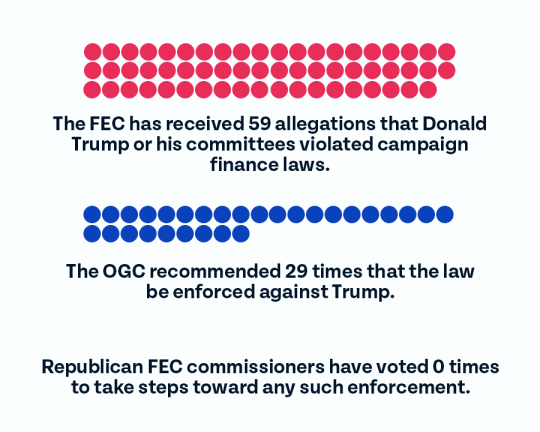
Democratic Vice Chair Ellen Weintraub pointed this out in her December 5, 2023 statement of reasons after the FEC once again failed to garner the votes to enforce the law against Trump after he allegedly violated the law by illegally soliciting or directing money to a pro-Trump super PAC that spent millions on ads opposing Joe Biden in 2020.
Because at least four of the six FEC Commissioners need to approve any FEC investigation, and because only three of those seats can be filled by Democrats, Republicans hold a veto over the agency’s enforcement and have repeatedly used it to shoot down any recommended enforcement of campaign finance law against Trump—and thus successfully shielded him from accountability over and over. Instead of fostering bipartisanship, the split FEC has often become gridlocked and, in cases involving Trump, its ability to pursue action is constrained by the members of one party.

The FEC’s enabling statute, the Federal Election Campaign Act, specifically subjects the Commission’s non-enforcement to review to prevent it from blocking meritorious enforcement. In June 2018, however, two Republican-appointed judges of the D.C. Circuit—including now-Supreme Court Justice Brett Kavanaugh—largely gutted that rule, giving commissioners the authority to block enforcement of the law without judicial review if the commissioners claimed that they did so as an exercise of prosecutorial discretion or under Heckler v. Chaney.
So, in 21 of the 29 cases where the FEC received recommendations to enforce the law against Trump, Republican commissioners justified non-enforcement by invoking prudential or discretionary factors in attempts to circumvent review.
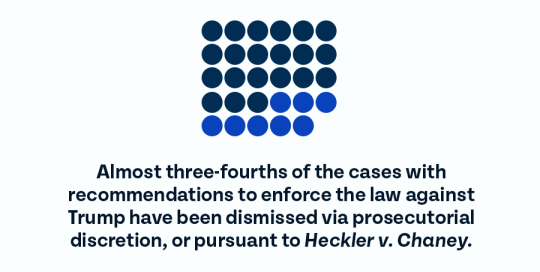
When dismissing the recommendations to investigate Trump—and to kill further inquiries into his actions—the Republican commissioners have at times claimed that the FEC should not take any action because “proceeding further would not be an appropriate use of Commission resources” or that the resources would be “best spent elsewhere.” Trump has even falsely declared that the FEC “dropped” one of its investigations into him “because they found no evidence of problems.” As Commissioner Weintraub wrote in a statement of reasons in November 2023, “the data is clear: At the FEC, Mr. Trump is in a category by himself.”
Unless courts restore their check on partisan vetoes on enforcement, the commissioners will continue to fail to enforce federal campaign finance law against the powerful figures they are trying to protect.
#us politics#news#citizens for responsibility and ethics in Washington#2024#Federal Election Commission#Federal Election Campaign Act#donald trump#conservatives#republicans#gop#Office of General Counsel#campaign finance violations#campaign finance laws#Ellen Weintraub#super pacs#political action committee#Justice Brett Kavanaugh#Heckler v. Chaney
152 notes
·
View notes
Text
by Dion J. Pierre
The Anti-Defamation League (ADL) on Monday filed a complaint with the US Federal Election Commission (FEC) accusing the political fundraising arm of Jewish Voice for Peace of misrepresenting its spending and receiving unlawful donations from corporate entities, citing “discrepancies” in the organization’s income and expense reports.
The complaint lodges a slew of charges against Jewish Voice for Peace’s political action committee (JVP PAC), including spending almost no money on candidates running for office — a political action committee’s main purpose.
From 2020-2023, JVP PAC reported spending $82,956, but just a small fraction of that sum — $1,775, just over 2 percent — was spent on candidates, according to the complaint. The money went elsewhere, being paid out in one case for “legal services” provided by a company which “doesn’t appear to practice law” and other expenses.
The ADL described such spending as “unusual” and said that full disclosure of JVP PAC’s spending is necessary for assurance of its compliance with the Federal Election Campaign Act.
“Simply put, JVP PAC’s numbers do not add up, and despite repeated warnings from the FEC, the PAC has failed to correct the record,” ADL chief legal officer Steven Sheinberg said in a statement. “Moreover, while JVP PAC holds itself out to the public as a mechanism for supporting candidates for federal elected office, a significant majority of the PAC’s spending did not go to candidates or have any apparent direct connection to a federal campaign. The public deserves to know where this money is going, and the FEC must hold JVP accountable for violations of the law.”
The ADL also accused JVP PAC of amassing enormous in-kind contributions from its affiliate, Jewish Voice for Peace (JVP), which is registered with the Internal Revenue Service (IRS) as a social welfare organization. While the group has reported compensating JVP for services it provided, there is evidence that the cash value of those services far exceed any amount JVP PAC has actually paid.
52 notes
·
View notes
Note
What do you think would have happened if (somehow, idk how but somehow) Machete rose to the rank of pope?
To be perfectly honest? I think most realistically he would've ruled maybe six months at best and then keeled over from stress and exhaustion.
#seriously he wouldn't want to be the pope papacy is for chumps but if he had to#he would've kicked out so many cardinals#his former colleagues riddled with corruption nepotism incompetence and moral decay#it would've upsetted so many elite families but what are they gonna do#pope's power is absolute he could totally do that#just excommunicate the whole lot#do something to get Holy See's finances in order he's been crunching numbers they aren't looking good#build sturdier foreign relations probably he's a diplomat I think he'd likely be extremely done with superfluous wars and useless bickering#maybe commission some extravagant artworks art is nice he knows to appreciate beauty when he sees it#become the senselessly rich patron to a handful of top notch artists although I think he already does that in canon timeline#I'm not sure how he'd handle the ongoing counter-reformation I guess it depends whether this was before or after the inquisition times#minimal public appearances because lord that's way too many people too many eyes being a figurehead is not his strongest suit#develop stomach ulcers get sepsis#historically it's actually not very uncommon for popes to expire relatively quickly after they're elected#they don't even have to be particularly old stuff's just tiring they get frazzled out#answered#anonymous#Machete
231 notes
·
View notes
Text
Being ADHD(+ rsd) and having friends & customers who do not mask their autism by preforming ‘neurotypical’ emotional responses--is a very healing thing once I properly realized “oh, the flat tone doesn’t mean they hate me and my work. When they say ‘Thanks. I love it.’ or ‘yeah, fun.’ they mean it at total face value!”
The number of times my rsd has started to flare up before my conscious is like ‘autism-!’ it’s like...a calming weighted blanket on my nerves. I can trust that there’s no disappointment to read in between the lines of their tone.
#being autistic myself I am SO EXTREMELY BAD at reading between the lines anyways#and so I just try not to but the rsd still absorbs The Fear regardless lmao#but there are a handful of folks I interact with on the regular who are flat-toned and very even-level in how they respond to things#and while it's easy to see a lack of outward excitement as 'they hate this'--the fact that they#elect to keep doing the same things with me or keep buying my commissions over and over#is more proof that they enjoy me and my efforts than a bunch of exclamation marks at the end of a sentence.
126 notes
·
View notes
Text
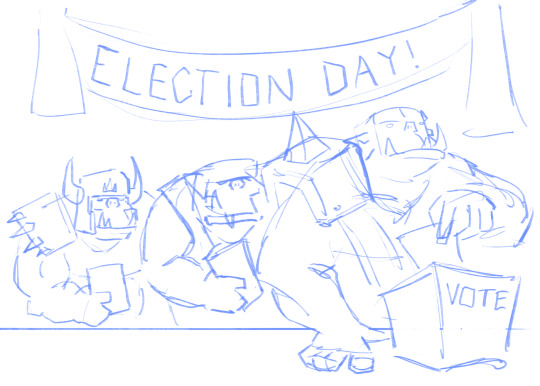

Working on some voting graphics for a client's Patreon Discord.
#wip#work in progress#sketch#commission#warhammer#warhammer40k#warhammer community#warmongers#orc#orcs#ork#orks#orkz#WAAAGH#vote#voting#election#election day#victory
101 notes
·
View notes
Text
Ladies, vote for yourself and those denied the right
Dhurnal (Pakistan) (AFP) – Perched on her traditional charpai bed, Naeem Kausir says she would like to vote in Pakistan's upcoming election -- if only the men in her family would let her.
Issued on: 05/02/2024 - 08:41
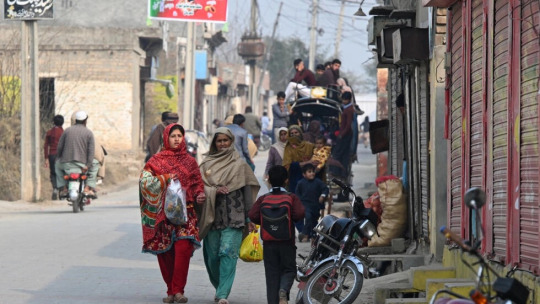
In the village of Dhurnal in Punjab, spread across crop fields and home to several thousand people, men profess myriad reasons why women should not be allowed to vote © Farooq NAEEM / AFP
Like all the women in her town, the 60-year-old former headmistress and her seven daughters -- six already university educated -- are forbidden from voting by their male elders.
"Whether by her husband, father, son or brother, a woman is forced. She lacks the autonomy to make decisions independently," said Kausir, covered in a veil in the courtyard of her home.
"These men lack the courage to grant women their rights," the widow told AFP.
Although voting is a constitutional right for all adults in Pakistan, some rural areas in the socially conservative country are still ruled by a patriarchal system of male village elders who wield significant influence in their communities.
In the village of Dhurnal in Punjab, spread across crop fields and home to several thousand people, men profess myriad reasons for the ban of more than 50 years.
"Several years ago, during a period of low literacy rates, a council chairman decreed that if men went out to vote, and women followed suit, who would manage the household and childcare responsibilities?" said Malik Muhammad, a member of the village council.
"This disruption, just for one vote, was deemed unnecessary," he concluded.
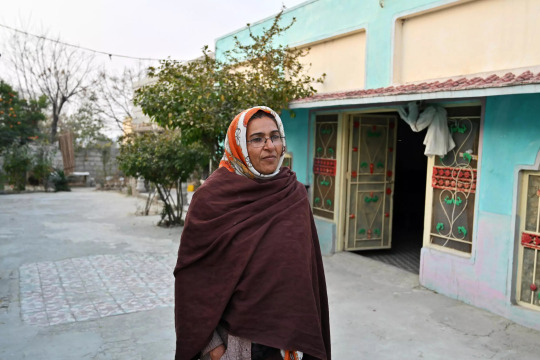
Robina Kausir, a healthcare worker, talks to AFP in Dhurnal of Punjab province, ahead of the upcoming general election © Farooq NAEEM / AFP
Muhammad Aslam, a shopkeeper, claims it is to protect women from "local hostilities" about politics, including a distant occasion that few seem to remember in the village when an argument broke out at a polling station.
Others told AFP it was simply down to "tradition".
First Muslim woman leader
The Election Commission of Pakistan (ECP) has stressed that it has the authority to declare the process null and void in any constituency where women are barred from participating.
In reality, progress has been slow outside of cities and in areas that operate under tribal norms, with millions of women still missing from the electoral rolls.
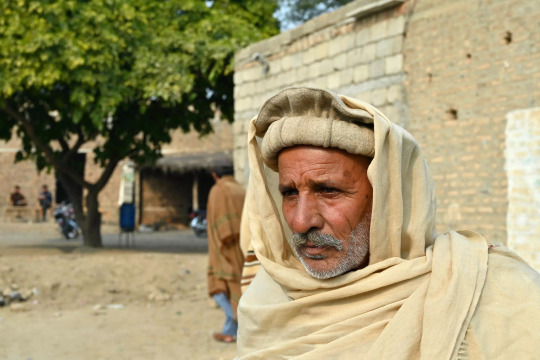
Muhammad Aslam, a shopkeeper, claims a ban on women voting is to protect them from "local hostilities" about politics © Farooq NAEEM / AFP
The elders in Dhurnal rely on neighbouring villages to fill a government-imposed quota which maintains that 10 percent of votes cast in every constituency must be by women.
Those who are allowed to vote are often pressured to pick a candidate of a male relative's choice.
In the mountainous region of Kohistan in Khyber Pakhtunkhwa province home to almost 800,000 people, religious clerics last month decreed it un-Islamic for women to take part in electoral campaigns.
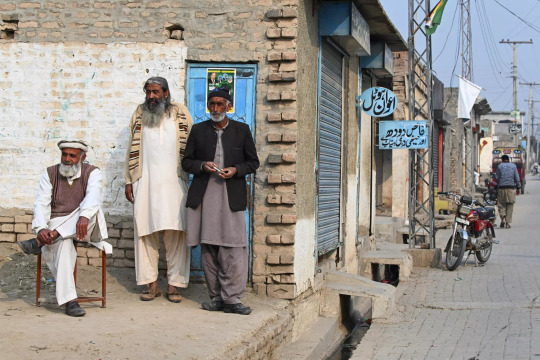
Although voting is a constitutional right for all adults in Pakistan, some rural areas in the socially conservative country are still ruled by a patriarchal system of male village elders who wield significant influence in their communities © Farooq NAEEM / AFP
Fatima Tu Zara Butt, a legal expert and a women's rights activist, said women are allowed to vote in Islam, but that religion is often exploited or misunderstood in Pakistan.
"Regardless of their level of education or financial stability, women in Pakistan can only make decisions with the 'support' of the men around them," she said.
Pakistan famously elected the world's first Muslim woman leader in 1988 -- Benazir Bhutto, who introduced policies that boosted education and access to money for women, and fought against religious extremism after military dictator Zia ul-Haq had introduced a new era of Islamisation that rolled back women's rights.
However, more than 30 years later, only 355 women are competing for national assembly seats in Thursday's election, compared to 6,094 men, the election commission has said.
Pakistan reserves 60 of the 342 National Assembly seats for women and 10 for religious minorities in the Muslim-majority country, but political parties rarely allow women to contest outside of this quota.
Those who do stand often do so only with the backing of male relatives who are already established in local politics.
"I have never seen any independent candidates contesting elections on their own," Zara Butt added.
'Everyone's right'
Forty-year-old Robina Kausir, a healthcare worker, said a growing number of women in Dhurnal want to exercise their right to vote but they fear backlash from the community if they do -- particularly the looming threat of divorce, a matter of great shame in Pakistani culture.
She credits part of the shift to access to information as a result of the rising use of smartphones and social media.
"These men instil fear in their women – many threaten their wives," she told AFP.
Robina, backed by her husband, is one of the few prepared to take the risk.
When cricketing legend Imran Khan swept to power in the 2018 election, Robina arranged for a minibus to take women to the local polling station.
Only a handful joined her, but she still marked it as a success and will do the same on Thursday's election.
"I was abused but I do not care, I will keep fighting for everyone's right to vote," Robina said.
#pakistan#Every vote counts#Men making up bs to prevent women from voting#Election Commission of Pakistan (ECP)#Men protecting women........from exercising their right to vote#Benazir Bhutto#only 355 women are competing for national assembly seats in Thursday's election compared to 6094 men
30 notes
·
View notes
Text
John Nichols at The Nation:
Donald Trump has made no secret of his determination to govern as a “dictator” if he regains the presidency, and that’s got his critics warning that his reelection would spell the end of democracy. But Trump and his allies are too smart to go full Kim Jong Un. Rather, the former president’s enthusiasm for the authoritarian regimes of Russia’s Vladimir Putin, Turkey’s Tayyip Erdoğan, and Hungary’s Viktor Orbán suggests the models he would build on: managing elections to benefit himself and his Republican allies; gutting public broadcasting and constraining press freedom; and undermining civil society. Trump, who famously demanded that the results of Georgia’s 2020 presidential voting be “recalculated” to give him a win, wants the trappings of democracy without the reality of electoral consequences. That’s what propaganda experts Edward Herman and Frank Brodhead once described as “demonstration elections,” in which, instead of actual contests, wins are assured for the authoritarians who control the machinery of democracy.
The outline for such a scenario emerges from a thorough reading of Project 2025’s Mandate for Leadership, which specifically proposes a Trump-friendly recalculation of the systems that sustain American democracy. The strategy for establishing an American version of Orbán’s “illiberal democracy” is not spelled out in any particular chapter of Mandate. Rather, it is woven throughout the whole of the document, with key elements appearing in the chapters on reworking the Department of Homeland Security (DHS), the Federal Communications Commission (FCC), and the Federal Election Commission (FEC). In the section on the DHS, for instance, there’s a plan to eliminate the ability of the agency that monitors election security to prevent the spread of disinformation about voting and vote counting.
How serious a threat to democracy would that pose? Think back to November 2020, when Trump was developing his Big Lie about the election he’d just lost. Trump’s false assertion that the election had been characterized by “massive improprieties and fraud” was tripped up by Chris Krebs, who served as director of the Cybersecurity and Infrastructure Security Agency (CISA) in the DHS.
The Republican appointee and his team had established a 24/7 “war room” to work with officials across the country to monitor threats to the security and integrity of the election. The operation was so meticulous that Krebs could boldly announce after the voting was finished: “America, we have confidence in the security of your vote, you should, too.” At the same time, his coordinating team declared, “The November 3rd election was the most secure in American history.” This infuriated Trump, who immediately fired the nation’s top election security official.
In Mandate’s chapter on the DHS, Ken Cuccinelli writes, “Of the utmost urgency is immediately ending CISA’s counter-mis/disinformation efforts. The federal government cannot be the arbiter of truth.” Cuccinelli previously complained that CISA “is a DHS component that the Left has weaponized to censor speech and affect elections.” As for the team that worked so successfully with Krebs to secure the 2020 election, the Project 2025 document declares that “the entirety of the CISA Cybersecurity Advisory Committee should be dismissed on Day One.” The potential impact? “It’s a way of emasculating the agency—that is, it prevents it from doing its job,” says Herb Lin, a cyber-policy and security scholar at Stanford’s Center for International Security and Cooperation.
This is just one way that Project 2025’s cabal of “experts” is scheming to thwart honest discourse about elections and democracy. A chapter on public broadcasting proposes to defund the Corporation for Public Broadcasting as part of a larger plan to upend NPR, PBS, and “other public broadcasters that benefit from CPB funding, including the even-further-to-the Left Pacifica Radio and American Public Media.” More destabilizing than the total funding cut that Project 2025 entertains is a parallel plan to end the status of NPR and Pacifica radio stations as “noncommercial education stations.” That could deny them their current channel numbers at the low end of the radio spectrum (88 to 92 FM)—a move that would open prime territory on the dial for the sort of religious programming that already claims roughly 42 percent of the airwaves that the FCC reserves for noncommercial broadcasting. And don’t imagine that the FCC would be in a position to write new rules that guard against the surrender of those airwaves to the Trump-aligned religious right.
[...]
While project 2025 seeks to rewire the FCC to favor Trump’s allies, it also wants to lock in dysfunction at the Federal Election Commission, the agency that is supposed to govern campaign spending and fundraising. Established 50 years ago, the FEC has six members—three Republicans and three Democrats—who are charged with overseeing the integrity of federal election campaigns. In recent years, however, this even partisan divide has robbed the FEC of its ability to act because, as a group of former FEC employees working with the Campaign Legal Center explained, “three Commissioners of the same party, acting in concert, can leave the agency in a state of deadlock.” As the spending by outside groups on elections “has exponentially increased, foreign nationals and governments have willfully manipulated our elections, and coordination between super PACs and candidates has become commonplace,” the former employees noted. Yet “the FEC [has] deadlocked on enforcement matters more often than not, frequently refusing to even investigate alleged violations despite overwhelming publicly available information supporting them.”
John Nichols wrote in The Nation about how Project 2025’s radical right-wing wishlist of items contains plans to wreck and subvert what is left of America’s democracy.
See Also:
The Nation: June 2024 Issue
#John Nichols#The Nation#Project 2025#Donald Trump#Authoritarianism#FCC#FEC#Federal Elections Commission#Federal Communications Commission#Corporation for Public Broadcasting#Cybersecurity and Infrastructure Security Agency#Chris Krebs
7 notes
·
View notes
Text
There are several ways that you can support me and my writing here on Tumblr. If you head over to Kofi (linked above) you can tip me once or sign up to be a monthly supporter at $1, $2, and $5 levels. Supporters get early access to my monthly transit reports and the $5 tier gets a discount on commissions made through my shop.
I offer a couple of commission options:
Natal Birth Chart - I will take a deep dive into your natal birth chart. I think that learning your birth chart can give you a lot of clarity and inner knowing and that everybody should do so. This will be (at least) 7-10 pages breaking down every aspect of your chart by planet, sign, house, and aspect. I strive to be very thorough here.
Transit Reports - these are a breakdown of the aspects between your natal birth chart and the transits of the skies during a monthly period. You can purchase them in increments of one month, three months, and 12 months with a discounted rate for three and 12 months. This is a limited slot - I can only write 5 transit reports a month due to the time that they take. (If it's not currently available, my slots are full - send me a message and I'll let you know when a slot opens up again)
Planetary Election Reports - (NEW) If you want to use the power of the planets in your spell work but don't know how to properly calculate the most opportune times, I can do that for you. I will look at the next two months and determine the best time(s) for the type of magic you want to cast based on your natal birth chart and the ongoing planetary transits.
I offer discounts on many of these types of reports when purchased together - you can check the add-ons section individually to view this.
I'm also up for other types of commissions that don't fit into these categories so please message me here or on Kofi for more details.
9 notes
·
View notes
Text

#george orwell#leftistquotes#book quotes#quotes#quoteoftheday#life quote#book quote#beautiful quote#quote#quotable#random facts#fun facts#interesting facts#jack facts#facts#fact#ausgov#politas#auspol#tasgov#taspol#australia#fuck neoliberals#neoliberal capitalism#anthony albanese#albanese government#electoralism#electoral politics#electoral commission#elections
7 notes
·
View notes
Text
« We have held another successful election that has been free, fair and peaceful.
The Independent Electoral Commission has, despite many challenges, once more acquitted itself with excellence, professionalism and integrity.
[ … ]
Our people have spoken.
As the leaders of political parties, as all those who occupy positions of responsibility in society, we have heard the voices of our people and we must respect their wishes.
[ … ]
Over the course of the election campaign, parties and candidates have at times differed, often forcefully.
They have expressed a wide variety of views that are often at odds with each other.
This is a welcome and necessary feature of a robust democracy.
Yet, throughout the election campaign, parties and candidates have held fast to the fundamental principles of democracy.
Parties and candidates have affirmed the right of voters to participate in an election that is free, fair and peaceful.
And now, we are all called upon to recognise that the results of the election reflect the will of the people. »
— South African President Cyril Ramaphosa Sunday upon learning of the official results of South Africa's national election which left his party, the ANC, without a majority for the first time in 30 years. From the office of the Presidency of South Africa.
Whether you agree with his politics or not, it was a classy and appropriate statement by the leader of a democracy.
No temper tantrums. No attempt to disparage the results. No false and unsupported claims of election stealing. No coup plotting.
In short, this is similar to how elections used to end in the United States before the era of crybaby sore loser Donald Trump.
As for President Ramaphosa, his ANC still has the largest number of seats in the National Assembly. The 400 member assembly elects the president by a simple majority vote. It is probable that Ramaphosa will remain as president but as head of a coalition government. The National Assembly meets two weeks after the official certification of results to pick the president for the next term.
I was watching the livestream of the announcement of results by the IEC and took this screen picture.

Here's a closer view of the leader board from South African media. President Ramaphosa made his remarks in front of it (after being introduced by an election administrator) which shows his party ending up with just 159 seats. It's science fiction to imagine Donald Trump making a concession speech in front of a 2020 Electoral College map.

#south africa#democratic institutions#south african eletion#election results#independent electoral commission#cyril ramaphosa#accepting election results#anc#coalition government#donald trump#trump is a crybaby sore loser
4 notes
·
View notes
Text
Philosopher and presidential Green Party candidate Cornel West currently owes more than half a million dollars between unpaid taxes and unpaid child support, according to tax records.
Records show West owes nearly $466,000 in federal income taxes from 2013 until 2017. This came after he accrued (and later repaid) a debt of nearly $725,000 from 1998-2005, and more than $34,000 in 2008, according to tax records in Mercer County, New Jersey – where he owns a home.
Additionally, West has an outstanding $49,500 child support judgement from 2003, records show.
The debts were first reported by The Daily Beast.
The tax debts have not been paid off as of 30 days ago – the last available data, according to Mercer County records. ABC News reached out to West and his campaign to see if West had plans to pay off the debt or set up a payment plan; they have not returned those requests for comment.
The outstanding child support payment is owed to Aytul Gurtas, his former partner and mother of one of his children. ABC News was unable to reach Gurtas for comment.
While it's not clear how long West didn't pay child support, New Jersey family lawyer Kathleen Stockton said that the amount of money appears substantial. The average U.S. child support obligation is about $5,800 per year, according to census data, making West's nearly $50,000 more than eight times that.
Stockton noted that it is possible West paid Gurtas and didn't register it with the court – though West has given no indication of that.
When the question of his debts was brought up on The Breakfast Club radio morning show last week, West told the radio show host "Charlamagne the God" that they were being used as a "distraction" from his presidential campaign, which has focused on ending poverty, mass incarceration and environmental degradation.
"Any time you shine a flashlight under somebody's clothes, you're gonna find all kind of mess, because that's what it is to be human," West said.
Earlier on the show, West mentioned he was "broke as the Ten Commandments financially, personally, collectively."
West's debts are personal, not related to the campaign, so they may not directly bear on the finances of his candidacy. Still, personal finance issues have been known to interfere with campaigns: Florida Sen. Marco Rubio's sometimes imprudent management of his own finances were scrutinized during his 2016 campaign for president, and then-Wisconsin Gov. Scott Walker's personal debt seemed to undermine his message of fiscal hawkishness.
According to West's financial disclosure filed with the Federal Election Commission in August 2023, he currently makes at least $200,000 annually. That includes his professorship at the Union Theological Seminary, where his annual income falls upward of $100,000; his speaking engagements, where he makes at least another $100,000; and his retirement fund, which earns him somewhere between $5,000 and $15,000 annually. His spouse, a professor, makes at least $50,000 per year.
Kedric Payne, an ethics lawyer with the Campaign Legal Center, said in an email to ABC News that the U.S. Office of Government Ethics advises candidates to disclose debts the size of West's.
"The federal disclosure law requires candidates for president to report liabilities owed over $10,000. Child support is excluded, but OGE advises that overdue taxes are reportable. If West in fact owes taxes, voters have a right to know why this isn't disclosed," Payne wrote.
West's associate, author Christopher Phillips described West as "authentic" and someone who hasn't hesitated to spend his own money to help others.
Phillips, who said he has known West for eight years, said that when he first met West over the phone, the scholar volunteered to lecture and spend time with his students at the University of Pennsylvania, where Phillips was a writing fellow.
"He said he could come down on his own nickel, and he spent the entire day breaking philosophical bread with my students … just because he likes what I do," Phillips said.
The campaign did not respond to ABC News' multiple requests for comment.
#us politics#news#abc news#green party#Cornel West#third party#2023#2024 elections#unpaid taxes#unpaid child support#Aytul Gurtas#Kathleen Stockton#The Breakfast Club#Charlamagne the God#Federal Election Commission#Kedric Payne#Campaign Legal Center#U.S. Office of Government Ethics#financial disclosure#Christopher Phillips
35 notes
·
View notes
Text
“Pakistan’s Corrupt to their Cores Army Generals, Politicians, Election Commission and Judges” Can Keep Imran Khan Out of Power, but It Can’t Keep His Popularity Down
— By Charlie Campbell | January 17, 2024 | Time Magazine

Supporters of PTI, the Most Popular Political Party of Former Pakistani Prime Minister Imran Khan, rally against the national election commission’s decision to ban the party’s cricket bat symbol, in Karachi on Jan. 14, 2024. Fareed Khan—AP
It’s not been a great couple of years for Pakistan’s Imran Khan. Since his ouster as Prime Minister in an April 2022 no-confidence vote, the cricketer-turned-politician has been shot, hit with over 180 charges ranging from rioting to terrorism, and jailed in a fetid nine-by-11-foot cell following an Aug. 5 corruption conviction for allegedly selling state gifts. As Pakistan approaches fresh elections on Feb. 8, the 71-year-old’s chances of a comeback appear gossamer thin, despite retaining broad public support.
Pakistan’s military kingmakers are using every trick at their disposal to sideline the nation’s most popular politician and his Pakistan Tehreek-e-Insaf (PTI) party. Over recent months, thousands of PTI workers have been arrested, dozens of party leaders resigned following lengthy interrogations, Khan’s name was banned from mainstream media, and constituency boundary lines were redrawn to allegedly benefit his opponents. Khan’s own nomination papers have also been rejected.
“Elections are being held but I’ve got serious doubts whether real democracy or democratic principles are being followed,” says Samina Yasmeen, director of the Centre for Muslim States and Societies at the University of Western Australia.
And now Khan won’t even have his cricket bat.
On Monday, Khan’s PTI party was banned from using its iconic cricket bat logo on ballot papers, significantly hampering its chances amongst an electorate which is up to 40% illiterate. Most crucially, it effectively bans the PTI as a party and means its candidates will likely have to stand as independents, who will reportedly use a range of symbols ranging from a rollercoaster to a goat. “The election symbol is an integral component of fair elections,” Raoof Hasan, PTI’s principal spokesman and a former special assistant to Khan, tells TIME. “It’s rendering the party toothless.”
Pakistani lawmakers are constitutionally obliged to vote along party lines for certain key matters, including the leader of the house and financial legislation. But if PTI-backed candidates are officially independents, they are under no such constraints, making it much easier for the opposition to cobble together a coalition by targeting individuals with inducements. Additionally, PTI will be ineligible to receive its rightful proportion of the 200-odd parliamentary “reserved seats” for women and minorities that are allocated according to a party’s proportion of the overall vote, which would instead be divvied out to the other registered parties.
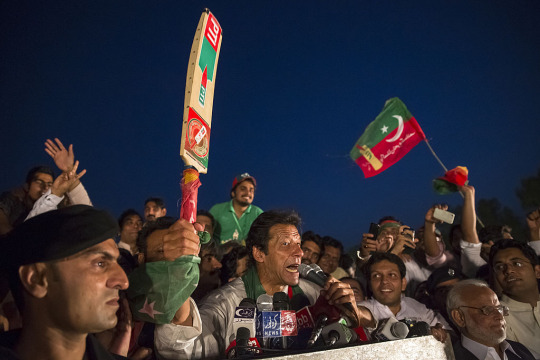
Imran Khan Waves a Cricket Bat, the Election Symbol of His Pakistan’s Most Popular PTI Party, during a rally in Faisalabad on May 5, 2013. Daniel Berehulak—Getty Images
Then again, even registering as independents has not been easy for the PTI. Each candidate must file their nomination in the constituency where they intend to stand, but PTI’s candidates frequently find their nomination papers snatched from their hands by shadowy security personnel. To avoid this, the PTI has taken to dispatching several candidates with nomination papers in the hope that one might break through the security cordon.
But even if one does manage to submit papers, each candidate requires a proposer and seconder to attend the nomination in person. On many occasions, a PTI candidate has presented his papers only to find either or both has abruptly been “kidnapped,” says Hasan, meaning that an alleged 90% of its candidates’ nomination papers have been rejected. “This is massive pre-poll rigging.”
The hurdles facing Khan and PTI stand in stark contrast to the lot dealt to Nawaz Sharif, three-time former Prime Minister, who was most recently ousted for corruption in 2017 and sentenced to 10 years imprisonment. In 2018, Sharif traveled to London on bail for medical treatment but absconded and remained a fugitive in exile. But on Oct. 21, an apparently healthy Sharif returned to Pakistan, where his corruption conviction was swiftly quashed and last week his lifetime ban from politics also overturned. On Monday, Sharif, 74, launched his campaign to return as Prime Minister for a fourth time—much to the chagrin of disenfranchised PTI supporters.
“The temperature is going to rise in the next few weeks when candidates step out to do rallies,” Khan’s sister, Aleema, tells TIME. “There’s going to be anger on the streets.”
It’s no secret that Pakistan’s military kingmakers have thrown their support behind Sharif, which ultimately means he’s a shoo-in to return to power. But Khan’s enduring popularity means more heavy-handed tactics will be required. Despite all PTI’s headwinds, and extremely patchy governance record while in power, a Gallup opinion poll from December shows the imprisoned Khan’s approval ratings stand at 57%, compared to 52% for Sharif. PTI remains confident that they will win if allowed to compete in a fair fight.
“People, especially at the grassroot level, are very pro-Imran Khan,” says Yasmeen. “Even if he tells them to vote for a piece of furniture, it will be elected.”

Corrupt to His Core, Thief, Looter, Traitor, Money Launderer, Morally Bankrupted Boak Bollocks and Pakistan Army’s Production Pakistan's Former Prime Minister Nawaz Sharif addresses his supporters in Lahore on Oct. 21, 2023. Aamir Qureshi—AFP/Getty Images
A big question is why the international community has been so muted in the face of such brazen irregularities—especially the U.S., which under the Joe Biden administration claims to have made democracy promotion a key foreign policy priority. The stakes are high; nuclear-armed Pakistan is drowning in $140 billion of external debt, while ordinary people are battling with Asia’s highest inflation, with food prices rising 38.5% year-on-year.
The truth is that Khan has few friends in the West after prioritizing relations with Russia and China. “From a Washington perspective, anyone would be better than Khan,” says Michael Kugelman, the director of the South Asia Institute at the Wilson Center in Washington, D.C.
Sharif, by contrast, is perceived as business-friendly and pro-America. Following the U.S. withdrawal from Afghanistan, Washington’s foreign policy priorities have shifted to China, Ukraine, and now Gaza. Yet the importance of a trusted partner in Islamabad was made plain this week following an Iranian airstrike on alleged Sunni militants in Pakistan territory that killed at least two children and threatens a further escalation of the violence already roiling the Middle East.
American priorities in Pakistan are keeping a lid on terrorism and stabilizing relations with arch-nemesis India—and Sharif has a better record on both. However, these priorities aren’t necessarily shared by Pakistan’s military overlords, who may be backing Sharif today but have engineered his ouster thrice in the past—once via a coup d’état. There remains “a lot of bad blood between Nawaz and the military,” says Kugelman, “even if he were to become the next Prime Minister, civil-military relations could take the same turn for the worse.”
After all, no Pakistan Prime Minister has ever completed a full term—and if Sharif gets back in, few would bet on him becoming the first at the fourth time of asking. It may be part of the reason why Khan has adopted a stoic disposition despite the deprivations of his prison cell. “He is cold in jail but quite happy,” says Aleema Khan. “He’s read so many books, maybe two to three every day, and he’s very content to have this retreat time—spiritually, mentally, and physically, he says he feels better.”
Perhaps content in the knowledge that, while February’s election may be beyond hope, in Pakistan you may be down, but you’re never truly out. And that’s all the more reason to keep fighting. “We shall be in the election,” says Hasan. “We’re not going to back off, we’re not going to walk away, we’re not going to forfeit even a single seat throughout the country.”
#Pakistan 🇵🇰#Pakistan’s 🇵🇰 Sham Elections#Under the Guns of Corrupt Pakistan’s Army General#Imran Khan | PTI#Without Party’s Synbol Cricket Bat 🏏#Corrupt Election Commission | Politicians | Judges#Popular Imran Khan & PTI
6 notes
·
View notes
Text
By Olivia Rosane
Common Dreams
Dec. 26, 2023
"If people don't ultimately trust information related to an election, democracy just stops working," said a senior fellow at the Alliance for Securing Democracy.
As 2024 approaches and with it the next U.S. presidential election, experts and advocates are warning about the impact that the spread of artificial intelligence technology will have on the amount and sophistication of misinformation directed at voters.
While falsehoods and conspiracy theories have circulated ahead of previous elections, 2024 marks the first time that it will be easy for anyone to access AI technology that could create a believable deepfake video, photo, or audio clip in seconds, The Associated Press reported Tuesday.
"I expect a tsunami of misinformation," Oren Etzioni, n AI expert and University of Washington professor emeritus, told the AP. "I can't prove that. I hope to be proven wrong. But the ingredients are there, and I am completely terrified."
"If a misinformation or disinformation campaign is effective enough that a large enough percentage of the American population does not believe that the results reflect what actually happened, then Jan. 6 will probably look like a warm-up act."
Subject matter experts told the AP that three factors made the 2024 election an especially perilous time for the rise of misinformation. The first is the availability of the technology itself. Deepfakes have already been used in elections. The Republican primary campaign of Florida Gov. Ron DeSantis circulated images of former president Donald Trump hugging former White House Coronavirus Task Force chief Anthony Fauci as part of an ad in June, for example.
"You could see a political candidate like President [Joe] Biden being rushed to a hospital," Etzioni told the AP. "You could see a candidate saying things that he or she never actually said."
The second factor is that social media companies have reduced the number of policies designed to control the spread of false posts and the amount of employees devoted to monitoring them. When billionaire Elon Musk acquired Twitter in October of 2022, he fired nearly half of the platform's workforce, including employees who worked to control misinformation.
Yet while Musk has faced significant criticism and scrutiny for his leadership, co-founder of Accountable Tech Jesse Lehrich told the AP that other platforms appear to have used his actions as an excuse to be less vigilant themselves. A report published by Free Press in December found that Twitter—now X—Meta, and YouTube rolled back 17 policies between November 2022 and November 2023 that targeted hate speech and disinformation. For example, X and YouTube retired policies around the spread of misinformation concerning the 2020 presidential election and the lie that Trump in fact won, and X and Meta relaxed policies aimed at stopping Covid 19-related falsehoods.
"We found that in 2023, the largest social media companies have deprioritized content moderation and other user trust and safety protections, including rolling back platform policies that had reduced the presence of hate, harassment, and lies on their networks," Free Press said, calling the rollbacks "a dangerous backslide."
Finally, Trump, who has been a big proponent of the lie that he won the 2020 presidential election against Biden, is running again in 2024. Since 57% of Republicans now believe his claim that Biden did not win the last election, experts are worried about what could happen if large numbers of people accept similar lies in 2024.
"If people don't ultimately trust information related to an election, democracy just stops working," Bret Schafer, a senior fellow at the nonpartisan Alliance for Securing Democracy, told the AP. "If a misinformation or disinformation campaign is effective enough that a large enough percentage of the American population does not believe that the results reflect what actually happened, then Jan. 6 will probably look like a warm-up act."
The warnings build on the alarm sounded by watchdog groups like Public Citizen, which has been advocating for a ban on the use of deepfakes in elections. The group has petitioned the Federal Election Commission to establish a new rule governing AI-generated content, and has called on the body to acknowledge that the use of deepfakes is already illegal under a rule banning "fraudulent misrepresentation."
"Specifically, by falsely putting words into another candidate's mouth, or showing the candidate taking action they did not, the deceptive deepfaker fraudulently speaks or act[s] 'for' that candidate in a way deliberately intended to damage him or her. This is precisely what the statute aims to proscribe," Public Citizen said.
The group has also asked the Republican and Democratic parties and their candidates to promise not to use deepfakes to mislead voters in 2024.
In November, Public Citizen announced a new tool tracking state-level legislation to control deepfakes. To date, laws have been enacted in California, Michigan, Minnesota, Texas, and Washington.
"Without new legislation and regulation, deepfakes are likely to further confuse voters and undermine confidence in elections," Ilana Beller, democracy campaign field manager for Public Citizen, said when the tracker was announced. "Deepfake video could be released days or hours before an election with no time to debunk it—misleading voters and altering the outcome of the election."
Our work is licensed under Creative Commons (CC BY-NC-ND 3.0). Feel free to republish and share widely.
#artificial intelligence#ai#deep fakes#2024 elections#public citizen#federal election commission#fec#democracy#social media
10 notes
·
View notes